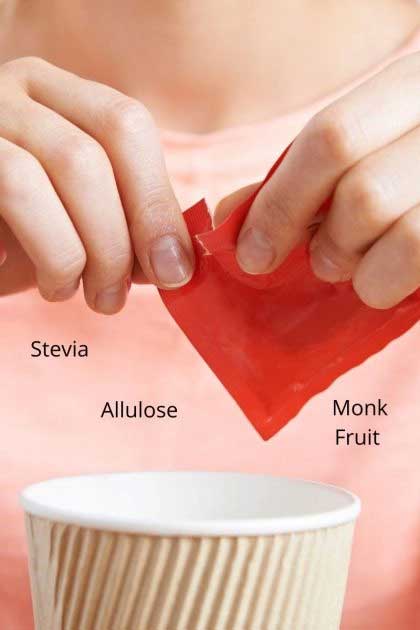INTRODUCTION
We’ve got a problem. We like it sweet – and many adults as well as most young kids, like it real sweet. But excess added sugar isn’t better for anyone. and for some, their current intake of any added sugar isn’t healthy. So non-nutritive sweeteners come to our rescue. Yes, we can have our sweets (cake, candy, soda, chocolate) and not elevate our blood sugars too – right? Wrong! research now shows that many non-nutritive sweeteners have their own associated health risks.
We all know sugar can be a cause of inflammation in the body. What about “natural sweeteners”? Do they help or hinder or have no effect at all on chronic inflammation? This article will explore the natural sweetener – inflammation connection.
WHAT ARE NATURAL SWEETENERS?

What are natural sweeteners anyway? “Natural”: (note: based on how these are processed, or what combined with they can also be “artificial”) Non-nutritive sweeteners can replace some added sugar to reduce calories and sugar intake. Because many are much sweeter than sugar, using a little can meet sweetness goals.
This can benefit dental health and may support better health outcomes – especially as we try to transition to less added sugar. For example, if you are eating a chocolate treat with several spoonfuls of added sugar, a chocolate bar or chips with a non-nutritive sweetener may help you enjoy your treat with less or no added sugar.
3 COMMON NATURAL SWEETENERS

Allulose
Origin: A monosaccharide (psicose) found naturally in limited numbers of foods including dried fruits like raisins as well as jackfruit; derived from corn for sweetener. It’s a good idea to look for non-GMO sources of allulose sweetener as corn is a big GMO crop. Sweetness: 70% as sweet as sugar.
Considerations: Most allulose (70%) is absorbed by the small intestine and excreted in the urine, and has no impact on blood glucose or insulin levels. The remaining allulose passes through your intestines and is excreted intact, and has minimal impact on our gut microbiome with little risk of GI distress.
As allulose isn’t metabolized by our system and has no impact on blood glucose or insulin levels, it’s a good alternative for diabetics. You may need to use a little more allulose to sweeten things up as it’s not quite as sweet as sugar.
Monk Fruit
Origin: Derived from Luo Han Guo plant native to Southern China. It’s also known as “Buddha fruit”. It’s been used for centuries in China in traditional Chinese medicine, however, it was not approved for use by the FDA as a sweetener until 2010. Sweetness: 150-200x sweeter than regular sugar.
- Considerations: Monk fruit sweeteners are often in the crystal form, which is combined with erythritol
- Generally recommended as a safe sweetener for diabetics.
Stevia
Origin: Leaves of the stevia plant native to South America. Sweetness: 200-300x sweeter than sugar
- Consideration: Often has a strong aftertaste.
- Can be highly refined to Reb A (vs whole leaf).
- A high sweetness level may negatively impact one’s sugar tolerance.
Instead of a diet soda, add stevia to sparkling water along with lemon or lime juice; or try using monk fruit to replace added sugar, or you may want to bake with allulose sweetened chocolate chips.
THE DATA ON NATURAL SWEETENERS
The research shows more than 40% of adults and as many as 25% of children consume low-calorie (non-nutritive) sweeteners. Of those consumers, 56% of adults and 80% of children reported using them daily, and the frequency of consumption increased with body weight in adults. The worldwide market for non-nutritive sweeteners was expected to reach $2.2 billion by 2020, with annual growth of more than 5% each year between 2008-2015.
Allulose is one of the newer sweeteners on the block. It has the look and mouthfeel of table sugar with fewer calories making it a better sweetener option.
Some research indicates that allulose may have anti-inflammatory properties. Bear in mind that most research has been done with animals – not humans. In studies with rats with Type II diabetes, allulose was found to decrease the production of pro-inflammatory molecules IL-6 and TNF – alpha as well as increase the production of the antioxidant, glutathione. A recent 2020 study showed allulose may work with gut bacteria to reduce inflammation and weight gain.
A study on Stevia indicated it may reduce the production of inflammatory compounds in certain cells. Stevia is loaded with the antioxidants, opigenin, kaempferol, and quereitrin. These guys help prevent DNA damage, endothelin secretion, and angiotensin-induced cell propagation.
Monk Fruit contains magrosides which are powerful antioxidants that help inhibit oxidation and DNA damage. The Chinese have used monk fruit for centuries to treat fevers, sore throats, and heat stroke due to its anti-inflammatory effects. A 2013 study found monk fruit’s anti-inflammatory properties may help regular blood sugar regulation.
LESS IS BETTER

Less is better when it comes to any sweetener — even natural ones.
Suggestions to get in less, more often:
- Add regular milk or unsweetened versions of non-dairy milk (cashew, coconut, oat) milk and creamers to your coffee, as these are often naturally sweet and may reduce the need for added sugars or natural sweeteners.
- Make homemade salad dressings with olive oil, vinegar, salt, and spices.
- Use fruit in baking or to satisfy a sweet craving – frozen fruit makes your favorites available every season.
- DIY sodas by adding a tablespoon of fruit juice to plain sparkling waters
- Swap added sugars for sweeter vegetables (sweet potatoes, pumpkin) in recipes (pancakes, muffins, smoothies).
- If you are currently using more than one packet/ serving of a sweetener, try shaking it down by half each time until you adjust to enjoying just one serving.
CONCLUSION
Although studies in humans are limited, based on animal studies these 3 natural sweeteners appear to have anti-inflammatory properties and do not appear to contribute to chronic inflammation — they may actually help decrease chronic inflammation. However, more human trials are needed.
Better nutrition gives your body what it needs to run better while avoiding what can irritate, overwhelm and disrupt those efforts. That means the more quality nutrients you pack into each bite and sip, the more your body gets what it needs. It also means what each person needs more of today will be different. That’s what makes personalized nutrition so much better for you.
Overall, we want to maintain a balance between limiting our overall intake of all types of sweeteners and equally focusing on reaching our daily nutrient intake goals. We are all in different stages of our personal health journeys so what’s better varies from person to person. This is why personalized nutrition is sooo important.
For example, your dietitian will personalize sweetener recommendations differently for a pregnant woman with gestational diabetes, a pre-diabetic, an athlete, an athlete with Type 1 diabetes, a person with rheumatoid arthritis, and another with Crohn’s disease.
Looking to shake up your sugar routine? No worries, I got you! Drop me an email and I’ll send you my free Guide to Sweeteners to help you get on the right track! This guide can help you determine which sweetener(s) and quantity are your better choices, more often. Leave a comment below and let me know how you like it!

